Freedom from hate
The chapters
Five countries, five campaigns, one central aim: to counter online hate speech against Roma in Eastern Europe.
- 01
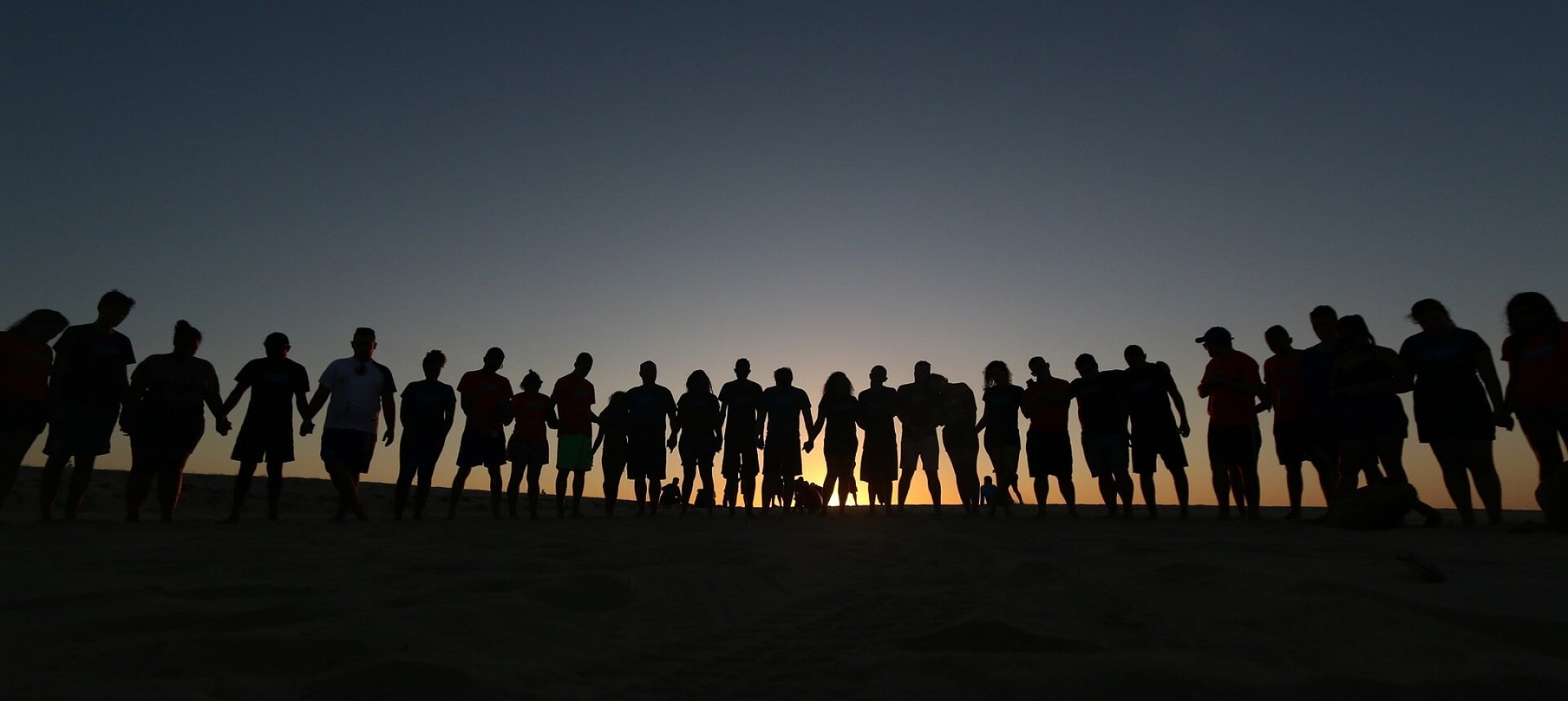
Introduction
The Roma community is the European Union’s (EU) largest ethnic minority, with a population of approximately six million residing in all EU member states. According to the EU’s Agency for Fundamental Rights, Roma ‘live in overwhelmingly…
2 min read
- 02
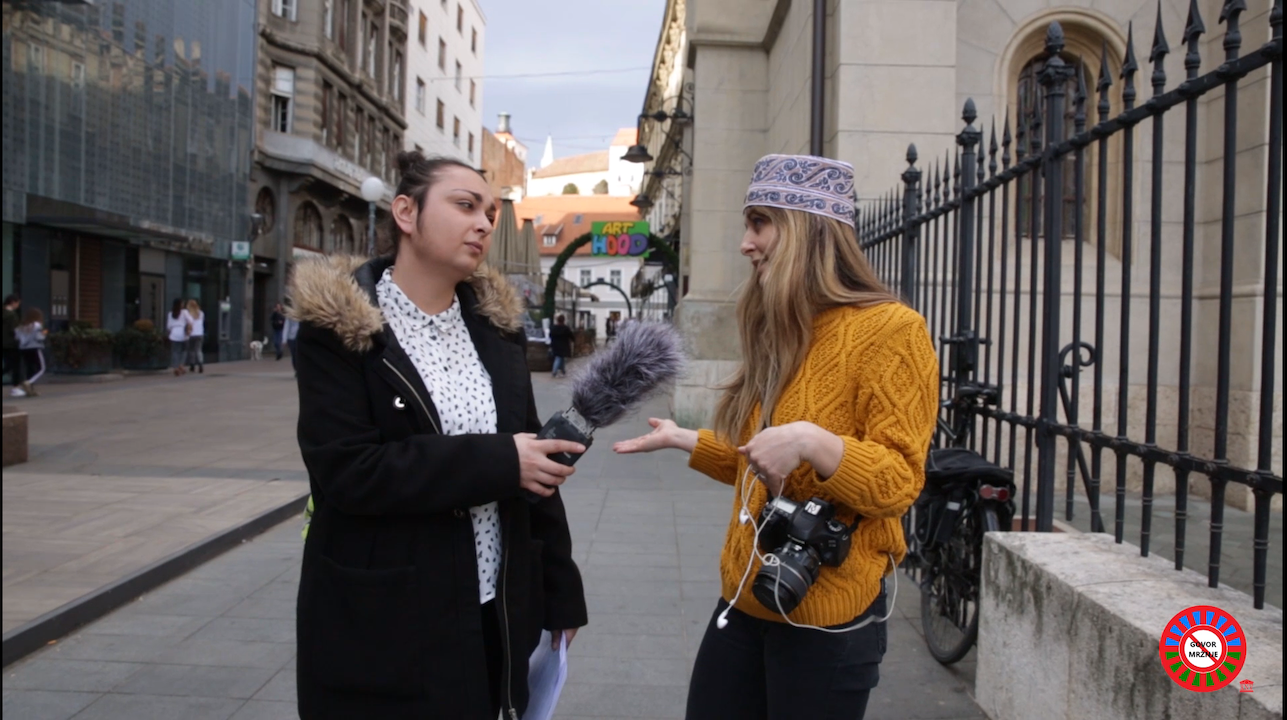
Partnering with media networks in Croatia
With limited online reach, the Roma National Council (RNV) had to approach this project more creatively. RNV stated in their campaign plan, ‘it is our firm conviction that the campaign in order to be effective (according to different…
1 min read
- 03

The power of memes in Slovakia
Tapping into the popular cultural phenomenon of ‘memes’ in the digital world, the Human Rights Institute (HRI) has achieved remarkable results in tackling the preconceptions and stereotypes inflicted on the Roma population in Slovakia. As…
2 min read
- 04
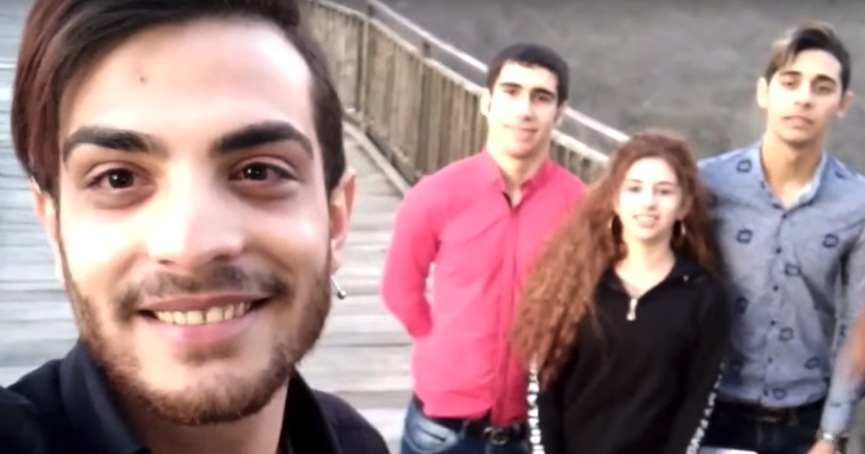
Using film to promote tolerance in Bulgaria
The Center for Interethnic Dialogue and Tolerance (Amalipe) is a leading Roma organization working for equal integration of Roma in Bulgarian society. Amalipe plays a central role in mobilizing the Roma civil movement and advocates for greater…
1 min read
- 05
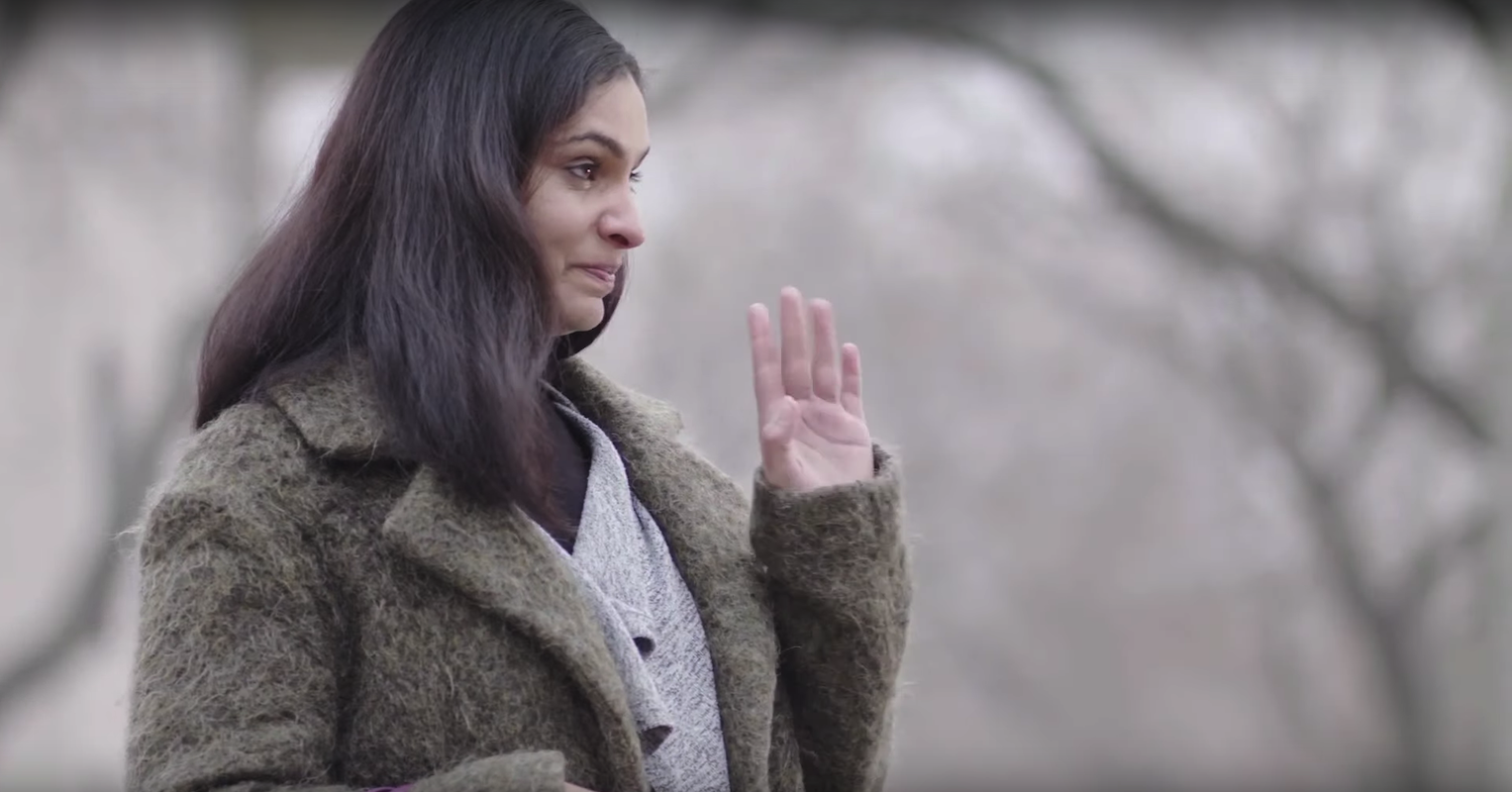
Challenging online hate speech in Hungary
The Hungarian Roma-led NGO Romedia is a regional media organization, running media campaigns to promote awareness and understanding of the Roma community. They have decades of experience in designing Roma-inclusive media approaches and…
1 min read
- 06
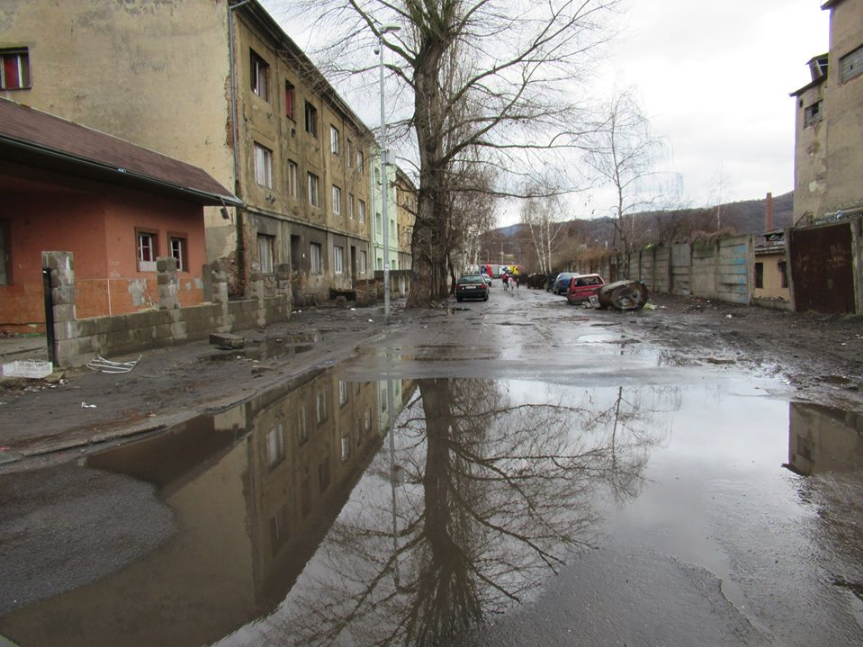
Busting myths about Roma housing in Czech Republic
Forum for Human Rights (FORUM), based in the Czech Republic, focuses on international human rights litigation and advocacy in Central Europe. Its lawyers represent several strategic cases in the Czech Republic aimed at fighting discrimination…
3 min read
-
The Roma community is the European Union’s (EU) largest ethnic minority, with a population of approximately six million residing in all EU member states.
According to the EU’s Agency for Fundamental Rights, Roma ‘live in overwhelmingly poor conditions on the margins of society, and face extreme levels of social exclusion’.
These poor conditions equally relate to issues of education, employment, health and life expectancy, and demonstrate the gross disparity between Roma and the majority of EU citizens.
There are many analyses to be made as to the causes of poverty and exclusion of Roma, but the one commonly agreed cross-cutting issue is that of prejudice, namely anti-gypsyism.
Widespread discrimination against Roma has translated into cyberhate across the EU. In the context of increasing prominence of far right groups and political parties, and growing nationalistic and xenophobic discourses, recent years have seen a rising tide of hate speech against Roma.
Freedom From Hate
Five organizations from five Eastern European countries have come together for the Freedom From Hate project, in order to address the growing issue of hate speech against the Roma community and to initiate a dialogue with social media companies about this problem.
These countries have some of the highest proportions of Roma population in the EU. Roma representatives in the five countries have all identified online hate speech targeting their communities, especially their youth, as an increasing concern.
Figures show that almost half of those who have suffered online abuse are ‘discouraged from engaging in public debates’, according to the Eurobarometer survey on Media and Pluralism.
As well as limiting online participation of Roma, online hate speech also plays a significant role in normalizing anti-gypsyism among what is often a mainstream and majority user audience.
The Freedom From Hate project’s aim has been to develop specific approaches to combating anti-gypsyism and promoting public participation of Roma on the internet and social media. Supporting this is essential if Roma are to realize social and economic inclusion within the EU.
Monitoring and reporting tools are also important, but will not by themselves address this need. Counter-speech measures need to utilize the public participation of Roma themselves, in particular through social media platforms, so that we are not just blocking hate speech, but countering the underlying prejudices that produce it.
Participating organizations:
- Amalipe, Bulgaria
- Forum for Human Rights, Czech Republic
- Human Rights Institute, Slovakia
- Roma National Council, Croatia
- Romedia Foundation, Hungary
Freedom From Hate also aims to provide the learning from these campaigns to other organizations and Roma activists, in order to encourage more counter-speech campaigns across Europe. You can now download our new Campaign Toolkit that helps to develop new campaigns against online hate speech.
An external evaluation of all five campaigns is also available online:
-
With limited online reach, the Roma National Council (RNV) had to approach this project more creatively.
RNV stated in their campaign plan, ‘it is our firm conviction that the campaign in order to be effective (according to different criteria) cannot be targeted at the general public. Changes in this conviction can only come about if we get partnership and support from some larger media organizations such as television with national frequency.’
This is because of RNV’s belief that the root cause of hate speech against Roma is formulated in news media and thus can only be solved via news media, focusing on a narrative of anti-fake news.
RNV proceeded to cooperate with popular TV programmes, Croatian news portals and the Nova Television Network to maximize the impact of their campaign.
Not only did this succeed in delivering their message to the online audience, but it also addressed the challenge of reaching non-internet users by interviewing people directly on the street, giving the project a physical presence amongst the population.
One of their most popular videos even features Miroslav Blažević, former coach of the Croatian national football team, who just happened to pass by at the time of filming (video in Croatian):
By using a classic street interviewing tactic, RNV managed to provide an insight into the Croatian public’s thinking on discrimination and racism against Roma people. By using these interviews and persuading popular TV channels to collaborate with them, they managed to transcend their limited social media following and reach a wide audience across Croatia.
Having a high profile person speaking out about the issue, such as the former coach of the national football team, also helped RNV to reach audiences their message would not normally reach.
-
Tapping into the popular cultural phenomenon of ‘memes’ in the digital world, the Human Rights Institute (HRI) has achieved remarkable results in tackling the preconceptions and stereotypes inflicted on the Roma population in Slovakia.
As a visual interface that incorporates both humour and information, memes act as an accessible medium on social media platforms for addressing contentious topics, such as the recent rapid increase in fake news.
The spread of fake news surrounding the Roma community is a key reason why misconceptions about them have become so engrained amongst the general populace, and thus HRI prioritized tackling this problem in their campaign objectives.
Thus, HRI distributed six different memes on a newly created Instagram account and their Facebook page and website, to maximise reach to a wide-ranging age demographic.
The campaign was extremely successful with engagement from the online community, proving to be quite a revolutionary method in quelling online hate speech against Roma.
Although HRI was concerned that the use of humour and sarcasm in addressing stereotypes of Roma people could be misinterpreted, it was actually well received and allowed HRI to convey complex messages through a simplified meme format.
For example, a significant stigma faced by the community in Slovakia is the unfair perception that they exploit the social benefit system, with Roma regularly accused of being the sole beneficiaries of state handouts.
HRI’s meme on this topic, which made it apparent that Roma people could not ‘all be on benefits’, attracted many positive responses. As comments on online posts dealing with contentious topics, such as this in Slovakia, are typically negative, the supportive feedback from this campaign suggested it had been very effective in countering the immense challenge of fake news and hate speech in the online world.
(Translation) – “What if I told you / that social benefits are received by 2,7% and there is 7,5% Roma, therefore they cannot be “all receiving benefits“
(Translation) – ‘For the first three children you get 830 euros when they are born, for the fourth and every other only 151 euros. So tell me how is it worth it for Roma women to have children for money.’
Memes are one of the best ways to reach wider online audiences, and HRI chose this tactic because they wanted to focus on people who are heavy internet users. By choosing imagery common in not just the main platforms but smaller chatrooms, they instantly managed to get more attention to their campaign. While the memes were funny, in their articles accompanying the memes HRI went into greater depth about the issues, busting popular misconceptions about the Roma community with facts, data and, of course, humour.
-
The Center for Interethnic Dialogue and Tolerance (Amalipe) is a leading Roma organization working for equal integration of Roma in Bulgarian society.
Amalipe plays a central role in mobilizing the Roma civil movement and advocates for greater Roma representation within government institutions. It has 11 Community Development Centres across Bulgaria, allowing it to work at the grassroots level. Through Amalipe’s work with Roma young people in schools, the issue of school segregation came up as one of the major problems Roma children face.
According to Amalipe and several European studies, the extreme social disparity is largely due to stereotypes and misconceptions about Roma people in general, and in the school context about Roma children in particular. This led Amalipe to develop a campaign to specifically challenge these perceptions.
Their campaign launched with a student competition, asking children to submit counter hate speech examples. The most successful of these was a short movie called ‘A Tolerance Movie’. The short film was done by volunteers and it conveys a simple but strong message: turn hate into tolerance.
Amalipe’s campaign clearly shows what committed and motivated volunteers can achieve together. The film making process became a team building experience that empowered volunteers to take ownership of campaigning projects.
While some would argue that professional film makers would be able to deliver a more ‘polished’ product, this project has its message written all over it: acceptance, tolerance and coming together can lead to a better world, as opposed to hate, fear and division. For a group of enthusiastic volunteers this tactic is the most perfect and honest way of telling their message to the public.
-
The Hungarian Roma-led NGO Romedia is a regional media organization, running media campaigns to promote awareness and understanding of the Roma community. They have decades of experience in designing Roma-inclusive media approaches and disseminating these messages through regional networks.
For the Freedom From Hate project, Romedia developed a campaign that targeted online hate speech (cyberhate) and negative stereotypes against the Roma community in Hungary. The campaign aimed to challenge the negative perceptions widespread among many Hungarians by showing how stigmatization and negative stereotypes exist in schools against Roma parents and school children.
Cyberhate is an ongoing problem in Hungary that further deepens negative prejudice and stigmatization of Roma in all areas of their life, for example in schools. This pernicious form of negative discrimination hinders all efforts to close the gap between Roma and non-Roma.
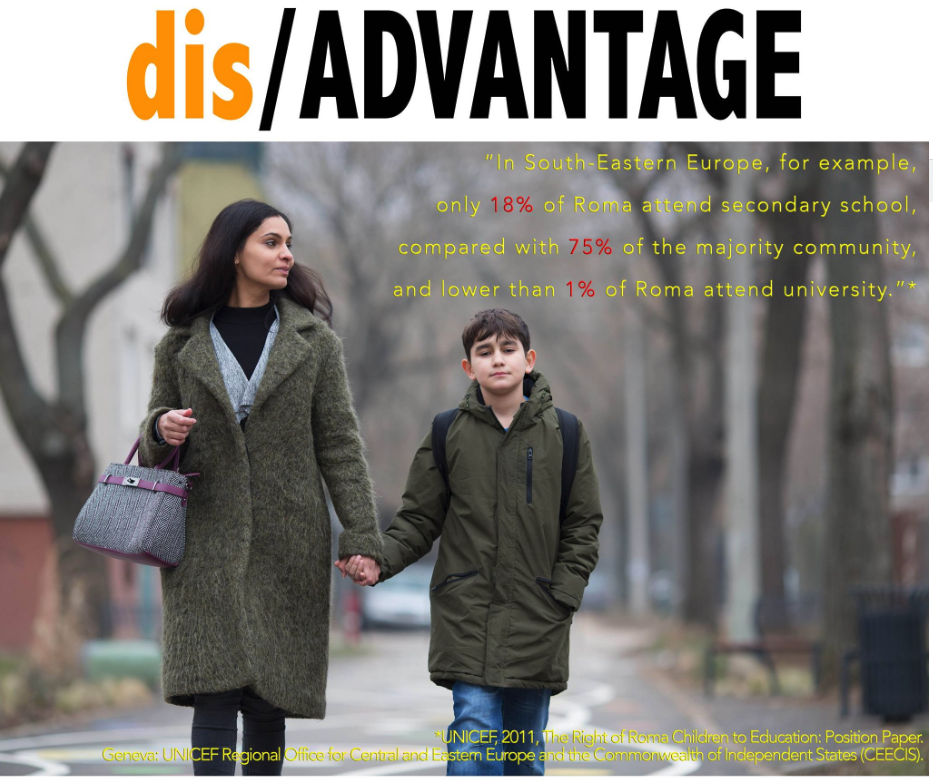
The campaign, focusing on an imaginary family, showed how both parents and children are subjected to discrimination and hate online.
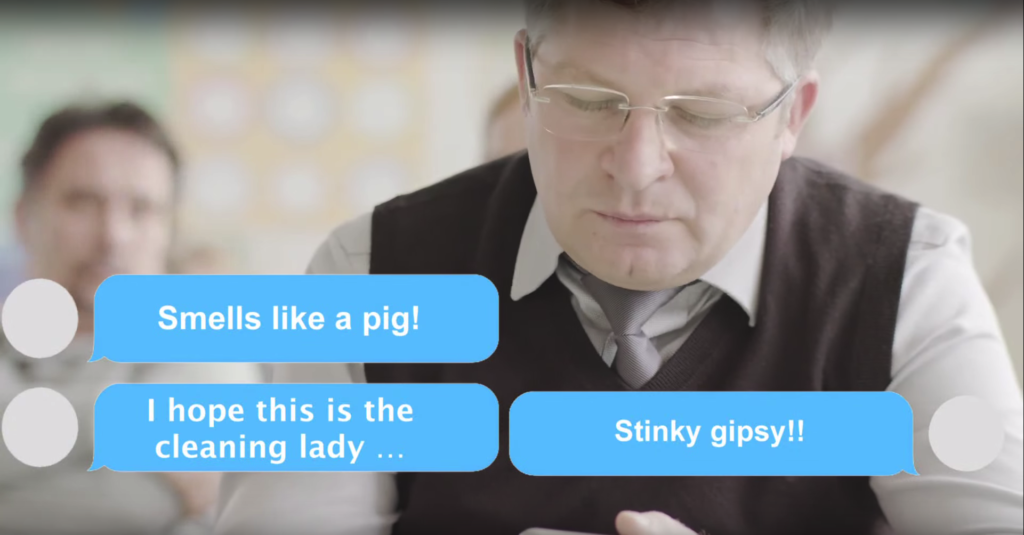
The video was a tool for raising awareness about online hate speech and bullying, using the story of a Roma family.
This is a perfect example of a visual campaign structured around a common theme, telling the story of a family and addressing online hate speech, which is often unnoticed, yet crucial problem in society. On top of the video, Romedia also used images to join the dots and capture the complexities of cyberhate.
For those with experience in filmmaking and digital media, using high definition video and photography to tell a story of social exclusion and discrimination is the perfect way forward in today’s photo and video oriented world.
-
Forum for Human Rights (FORUM), based in the Czech Republic, focuses on international human rights litigation and advocacy in Central Europe. Its lawyers represent several strategic cases in the Czech Republic aimed at fighting discrimination against Roma.
FORUM cooperates with international and local Roma NGOs, and as lawyers can contribute to positive and informed discussion around Roma. FORUM also works with LGBT+ and disabled people and has collaborated with other actors working on hate speech.
For the Freedom From Hate project FORUM developed a campaign around housing in the city of Ústí nad Labem, addressing the existing injustices and popular stereotypes against Roma people.
Their campaign aimed to challenge the belief that Roma people live for free by showing that in many cases wealthy landlords charge the state higher than normal rates, in order to provide housing for Roma on benefits.
Those benefits go directly into the pockets of the landlords, who in the vast majority of the cases are not Roma, whereas the popular belief is that Roma people take advantage of the benefit system and pocket the money themselves.
Their campaign included infographics, articles and interviews with affected people. One of the key issues it highlighted was the existence of the city’s so-called ‘benefit free zones’ – areas where Roma are systematically excluded from to encourage them to move to other parts of the city.
(Translation) ‘A benefit free zone is a locality which has been declared by the local government to be an area with an increased incidence of socially undesirable phenomena’. ‘Creation of benefit free zones will not prevent creation and existence of ghettos, but it will only relocate the people to places where there will be even less opportunities to be included in general society’.
FORUM has also made several interviews with locals who in all cases preferred their names not to be published due to fears of repercussions.
(Translation) ‘Magda and Pavel are a Roma husband and wife who have four kids. The family used to live at the “Blue Housing Facility” in Ústí nad Labem which was closed in 2018. The family struggled to find new accommodation even though they had saved enough money to pay for all necessary expenses. The family had to spend one month during the summer in a local school’s sports hall which was provided to families in a similar situation (after the closure of the Blue Housing Facility). Eventually, the family managed to rent a studio flat in the most deprived area of the city “Nivy”. They had to pay high “entry” fees and the rent is three times higher than the average rent in regular localities for 3 bedroom flats. The family has had to face many issues which are connected with life in socially excluded neighbourhoods. The kids who live there are surrounded by drugs, diseases and very poor hygienic conditions.’
In this highly targeted campaign, FORUM managed to include not just the stories of affected people, but also hard facts and verifiable data against some of the common stereotypes and misconceptions about the Roma community. FORUM set up a dedicated Facebook page for the campaign, and committed to regular and varied posts targeting the specific area of Ústí nad Labem with some Facebook advertising.
As a result they built a very relevant and interested follower base to make their voice heard in the heated debate around housing in the city. If an issue has a local focus, campaigns like this can make a huge difference and through the local efforts can help to shape national debates.
Related content
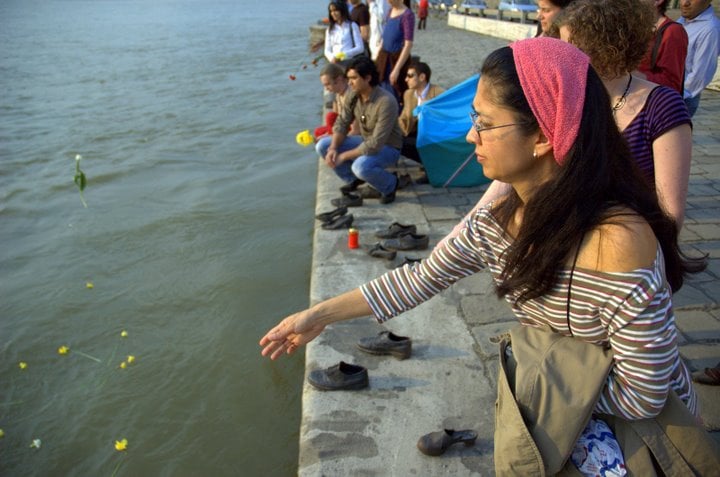
17 November 2020
Freedom From Hate: Empowering civil society to counter cyberhate against Roma
Location: Bulgaria, Croatia, Czech Republic, Hungary and Slovakia Duration: June 2018 – May 2020 Download the full evaluation: Click here…
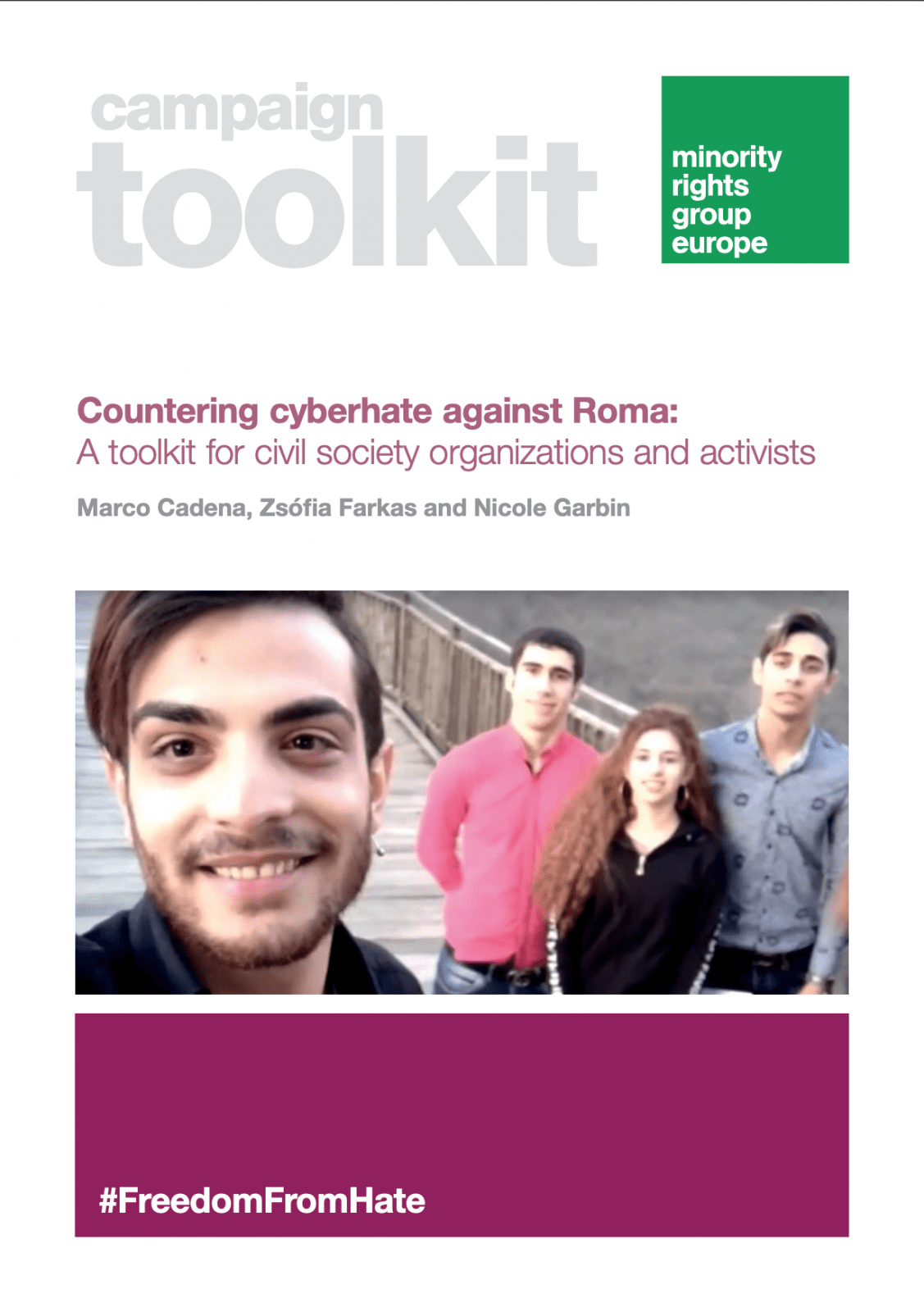
Campaign Toolkit – Countering cyberhate against Roma
With far-right groups becoming increasingly prominent and xenophobic discourse on the rise, in recent years there has been a resurgence of…